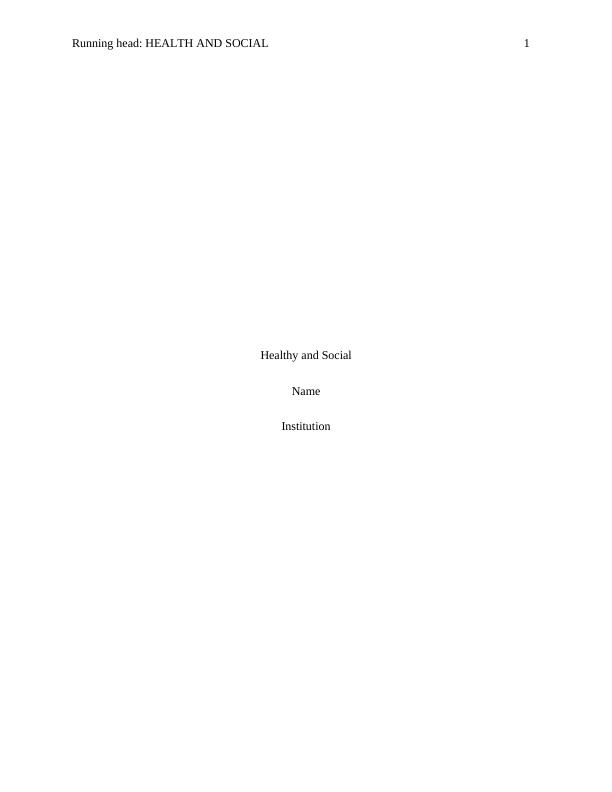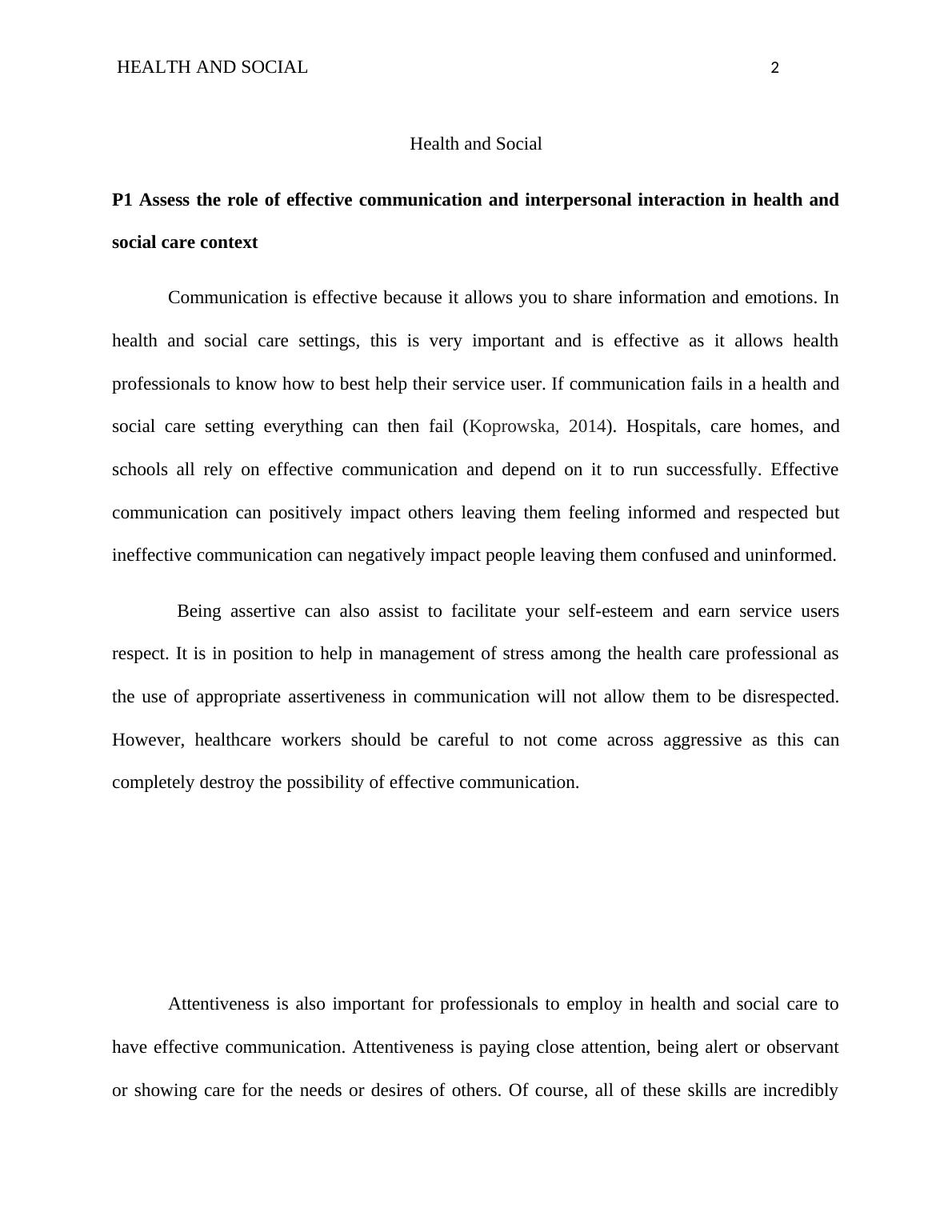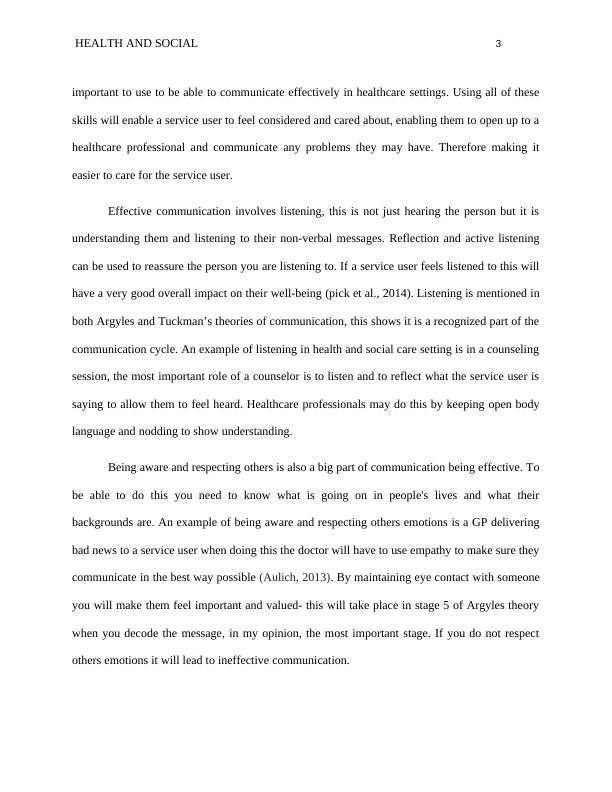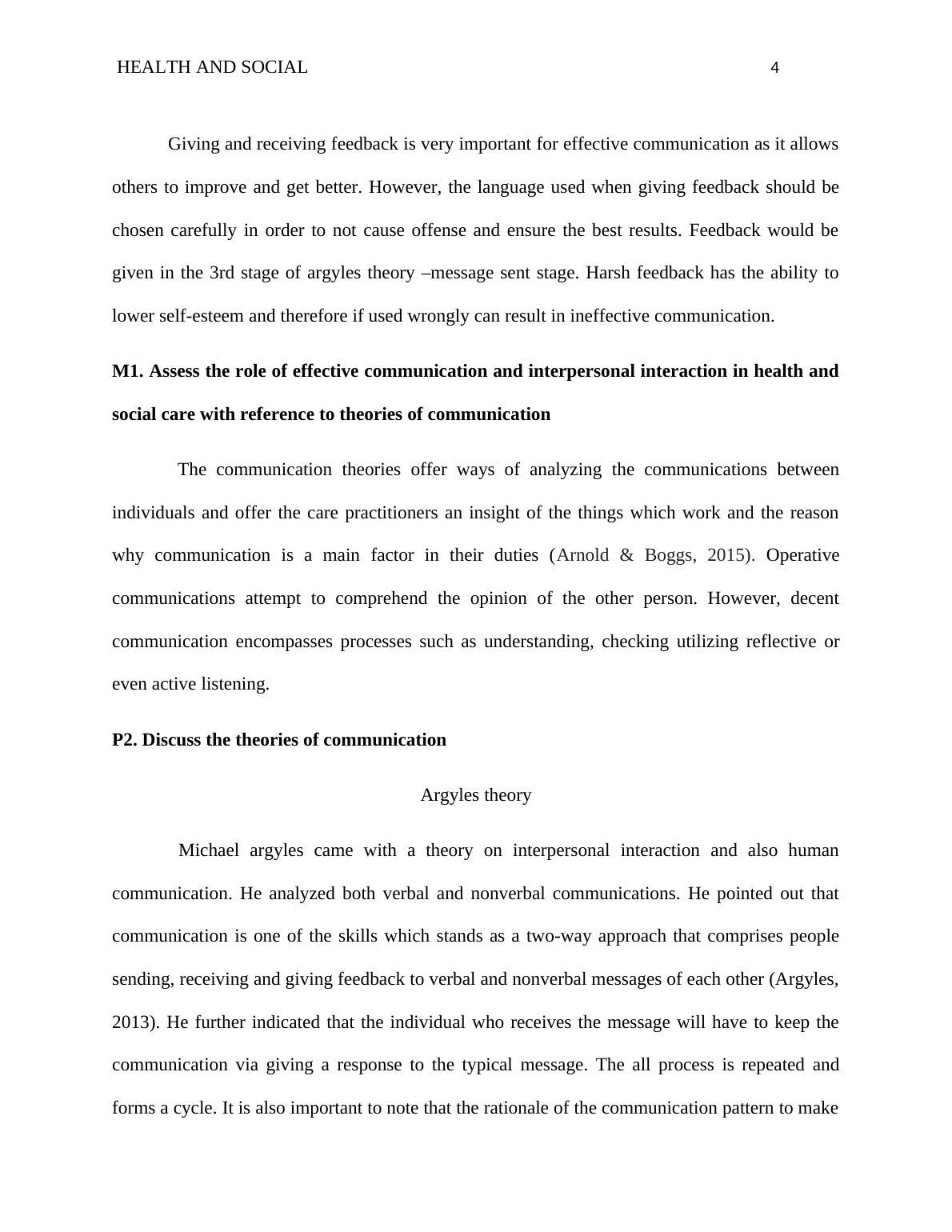The Role of Effective Communication
11 Pages2829 Words67 Views
Added on 2020-04-01
The Role of Effective Communication
Added on 2020-04-01
ShareRelated Documents
Running head: HEALTH AND SOCIAL 1Healthy and SocialNameInstitution

HEALTH AND SOCIAL 2Health and Social P1 Assess the role of effective communication and interpersonal interaction in health andsocial care contextCommunication is effective because it allows you to share information and emotions. Inhealth and social care settings, this is very important and is effective as it allows healthprofessionals to know how to best help their service user. If communication fails in a health andsocial care setting everything can then fail (Koprowska, 2014). Hospitals, care homes, andschools all rely on effective communication and depend on it to run successfully. Effectivecommunication can positively impact others leaving them feeling informed and respected butineffective communication can negatively impact people leaving them confused and uninformed. Being assertive can also assist to facilitate your self-esteem and earn service usersrespect. It is in position to help in management of stress among the health care professional asthe use of appropriate assertiveness in communication will not allow them to be disrespected.However, healthcare workers should be careful to not come across aggressive as this cancompletely destroy the possibility of effective communication.Attentiveness is also important for professionals to employ in health and social care tohave effective communication. Attentiveness is paying close attention, being alert or observantor showing care for the needs or desires of others. Of course, all of these skills are incredibly

HEALTH AND SOCIAL 3important to use to be able to communicate effectively in healthcare settings. Using all of theseskills will enable a service user to feel considered and cared about, enabling them to open up to ahealthcare professional and communicate any problems they may have. Therefore making iteasier to care for the service user.Effective communication involves listening, this is not just hearing the person but it isunderstanding them and listening to their non-verbal messages. Reflection and active listeningcan be used to reassure the person you are listening to. If a service user feels listened to this willhave a very good overall impact on their well-being (pick et al., 2014). Listening is mentioned inboth Argyles and Tuckman’s theories of communication, this shows it is a recognized part of thecommunication cycle. An example of listening in health and social care setting is in a counselingsession, the most important role of a counselor is to listen and to reflect what the service user issaying to allow them to feel heard. Healthcare professionals may do this by keeping open bodylanguage and nodding to show understanding. Being aware and respecting others is also a big part of communication being effective. Tobe able to do this you need to know what is going on in people's lives and what theirbackgrounds are. An example of being aware and respecting others emotions is a GP deliveringbad news to a service user when doing this the doctor will have to use empathy to make sure theycommunicate in the best way possible (Aulich, 2013). By maintaining eye contact with someoneyou will make them feel important and valued- this will take place in stage 5 of Argyles theorywhen you decode the message, in my opinion, the most important stage. If you do not respectothers emotions it will lead to ineffective communication.

HEALTH AND SOCIAL 4Giving and receiving feedback is very important for effective communication as it allowsothers to improve and get better. However, the language used when giving feedback should bechosen carefully in order to not cause offense and ensure the best results. Feedback would begiven in the 3rd stage of argyles theory –message sent stage. Harsh feedback has the ability tolower self-esteem and therefore if used wrongly can result in ineffective communication.M1. Assess the role of effective communication and interpersonal interaction in health andsocial care with reference to theories of communication The communication theories offer ways of analyzing the communications betweenindividuals and offer the care practitioners an insight of the things which work and the reasonwhy communication is a main factor in their duties (Arnold & Boggs, 2015). Operativecommunications attempt to comprehend the opinion of the other person. However, decentcommunication encompasses processes such as understanding, checking utilizing reflective oreven active listening.P2. Discuss the theories of communicationArgyles theory Michael argyles came with a theory on interpersonal interaction and also humancommunication. He analyzed both verbal and nonverbal communications. He pointed out thatcommunication is one of the skills which stands as a two-way approach that comprises peoplesending, receiving and giving feedback to verbal and nonverbal messages of each other (Argyles,2013). He further indicated that the individual who receives the message will have to keep thecommunication via giving a response to the typical message. The all process is repeated andforms a cycle. It is also important to note that the rationale of the communication pattern to make

End of preview
Want to access all the pages? Upload your documents or become a member.
Related Documents
Health Professional - Assignmentlg...
|6
|1133
|182
Humanistic Approach Communication Skills: Use of Silence, Paraphrasing, Reflecting, and Supportive Body Languagelg...
|3
|931
|384
Communication Skills and Techniques : Assignmentlg...
|7
|1383
|281
Therapeutic Communication Skills and Inter-Professional Collaborationlg...
|9
|2035
|226
Communication for Health Professionals Analysis 2022lg...
|9
|2471
|11
Public Health and Social Work (pdf)lg...
|13
|926
|65
